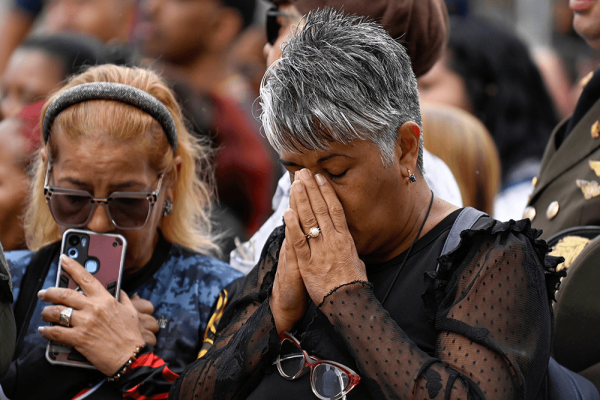After an Immigration and Customs Enforcement agent shot and killed Renee Nicole Macklin Good, faith leaders in Minneapolis joined demands that ICE leave their city and repent.
“We have our demands. Hundreds of clergy across this state who have gathered together across faith traditions are standing with the rest of Minnesotans to say not again,” Minister JaNaé Bates Imari, co-executive director of ISAIAH, a multiracial interfaith nonprofit, told a crowd of Minnesotans at a press conference.
The press conference, organized by ISAIAH, drew more than a hundred leaders from numerous faith traditions, representing the breadth of the city’s religious communities. ISAIAH presented its demands: That ICE agent Jonathan Ross be arrested, charged, and prosecuted for killing Good; that ICE immediately cease its surge in operations in the state; and that Congress investigate the Department of Homeland Security.
The book of Amos tells us of a priest named Amaziah, who is depicted as something of a rival prophet to Amos himself. The book itself is full of Amos’ harsh words against Israel’s exploitation of the poor and greedy indulgence of the rich, as well as prophetic calls to repentance before God’s judgment falls on the whole nation.
After the U.S. military’s abduction of Venezuelan President Nicolás Maduro, faith leaders are processing deep feelings of conflict, both with Maduro and with the U.S. intervention.
Rev. Ricardo Corzo Moreno is a Presbyterian pastor living in Caracas, Venezuela’s capital. Moreno’s apartment building is approximately one mile away from an air force base in La Carlota that was bombed in the attack. He described how shocked and terrified his neighborhood as bombs started dropping and planes flew at low elevation over their buildings.
“After everything ended ... it was a total silence. Nobody went out in the street; everyone stayed in their buildings. For the next 24 to 48 hours, Caracas became like an empty city,” Moreno said. “A lot of churches here in Caracas, they decided to cancel Sunday service because people were afraid that something would start happening in the population.”
If you ask TV writer and producer Vince Gilligan what his latest show, Pluribus, is about, he’ll turn the question right back around on you.
“I really like the idea of making a show and letting viewers tell us what it’s about,” Gilligan told Sojourners. “I don’t know that there’s any one answer to that question other than what the individual thinks.”
Blessed are the peacemakers, for they will be called children of God (Matthew 5:9). As followers of Jesus, this beatitude from the Sermon on the Mount offers a moral compass for how we treat our neighbors, including those in other nations. Jesus isn’t calling us to be passive; he’s calling us to actively make peace. I’m reminded of the Hebrew and Greek words for peace, shalom and eirene, which evoke a sense of repair or a “setting right” of what is broken. Jesus modeled this active pursuit of peace in his own life. Born into a community occupied by violent, imperial powers, Jesus rejected the logic of might-makes-right and instead ushered in something more powerful: God’s promised reign of justice, righteousness, and love. Today, that kind of restoration often requires combating the fear, hatred, hubris, and greed that so often undergird conflict.
Jesus’ call to be peacemakers feels especially urgent given that this year began with a literal bang: On Jan. 3, the Trump administration launched a military assault on Venezuela to abduct and arrest President Nicolás Maduro and his wife, Cilia Flores. At least 80 Venezuelans were killed by an attack that did not have congressional approval, violated international law, and set a dangerous precedent for a presidency characterized by extending and imposing U.S. power and influence on other countries through military force. Most significantly for us as Christians, the administration’s actions in Venezuela signal a further U.S. retreat from a commitment to protect human dignity, freedom, human rights, and peace.
During his life, Otto Maduro, the late Venezuelan sociologist and liberation theologian, lamented how the majority of Latin Americans were being treated to “fatten the bank accounts” of a small minority. This deeply troubled Maduro. As he wrote in his 1982 Religion and Social Conflicts, “I cannot submissively cross my arms in the face of certain allegedly ‘Christian’ attitudes and traditions that appear to me to be an antievangelical instrumentalization of the church in the service of social injustice.”
As we say goodbye (maybe even good riddance) to 2025, I’m reminded just how much prayer has served as an essential balm, refuge, and strong tower in the midst of such a trying and tumultuous year. Whatever 2026 has in store, I’m confident that we will need to flex our prayer muscles. Prayer centers us in God’s presence. Prayer prepares and equips us for courageous action. Prayer empowers us when we feel weak and encourages us when we feel demoralized.
I’m deeply grateful that we have a staff team that believes in the necessity of prayer, evidenced through the many short ones that they have shared below. My prayer as we sojourn together into 2026 is that our fervent prayers guide and embolden us to advance God’s reign of justice, peace, and steadfast love with greater urgency and courage.
On Thursday, Dec. 11, a man dismantled a nativity scene depicting Immigration and Customs Enforcement arresting the Holy Family at a Charlotte church. The now-viral video depicts the man knocking over the mannequins in ICE uniforms who appear to be detaining a kneeling Mary and Joseph.
For many of us who were raised Christian, our earliest memories of Christmas may have featured the town of Bethlehem. Whether through songs or the stories in scripture, this quaint town that welcomed the Christ child took on a central role in our faith.
The Department of Homeland Security’s move to suspend funding for Catholic Charities of the Rio Grande Valley—and to seek an unusually long ban on future federal grants—is prompting concern among Catholic leaders and immigration advocates who see the action as part of a broader effort to curtail faith-based humanitarian work at the U.S.-Mexico border.
CCRGV, a South Texas nonprofit led by Sister Norma Pimentel, has been given 30 days to respond to DHS’s proposed debarment, which would shut the organization out of most federal funding streams for six years.
The suspension, which applies only to the South Texas organization, not to Catholic Charities USA or other diocesan agencies nationwide, would be a major blow to CCRGV. The charity, which operates the Humanitarian Respite Center in McAllen, Texas, has been a major recipient of DHS funds through the Federal Emergency Management Agency’s Emergency Food and Shelter-Humanitarian program and its newer Shelter Services Program.







